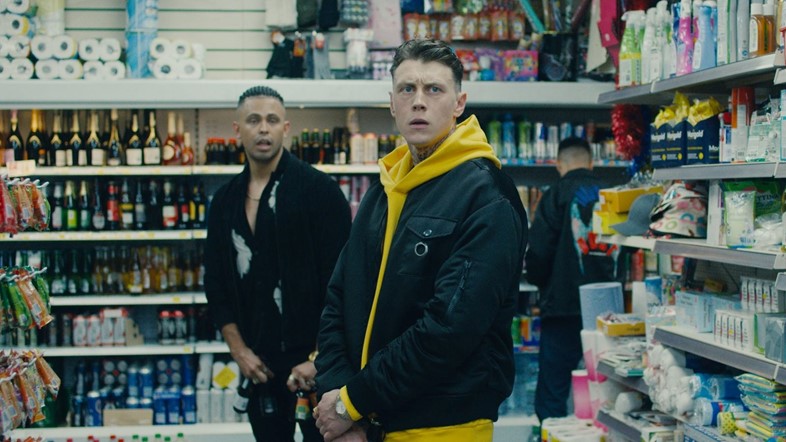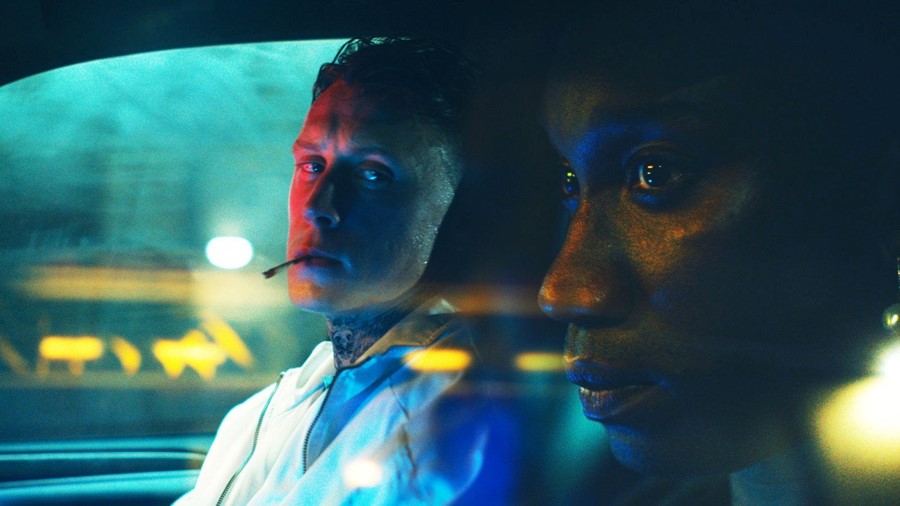As Femme is released in cinemas, co-director Sam H Freeman talks about his love of late-night neo-noir thrillers by Nicolas Winding Refn and the Safdies, and capturing the darkness of London
According to Swiss psychoanalyst Carl Jung, people project public images as an act of self-protection and come to identify with these personae over time. In queer noir thriller Femme, writer-directors Sam H Freeman and Ping Ng Choon use drag culture, repressed sexuality and the art of sweet revenge to study this very notion. “Our film rejects binary definitions of gender,” says Freeman of the film. “I think binary definitions become problematic when they are forced on people, and so this film isn't about ‘binaries’ in any form. And one of the binaries that it certainly isn’t about is ‘heroes’ and ‘villains’”.
In east London’s backstreets, Jules’ (Nathan Stewart-Jarrett) drag queen alter ego Aphrodite is subjected to a horrific homophobic attack. Preston (George MacKay), a roadman spewing hatred with every syllable uttered and every sinew flexed, is the source of the violence. Some time later, Preston is spotted in a gay sauna by Jules and the two hook up, with Preston blissfully unaware that his paramour is the same person he brutally beat to the curb. Jules plots his revenge.
“It is a film about identity and what makes an identity,” says MacKay, who brings pent-up Preston to life. The British actor had been riding the wave of Sam Mendes’ box-office triumph 1917 when this project cropped up. He says it was immediately evident that this was a “rare” role thanks to the “brilliance” of the script. “Sam and Ping really had their hand on the steering wheel,” he explains. “The script was so tight and there was a very clear roadmap.” His co-star Stewart-Jarret, sat beside him, concurs: “I thought ‘Wow’ [when I read it] and I also realised it was going to be very, very difficult. But that's really what attracted me to it – along with the story.”
One-time housemates, Freeman and Ng Choon cooked up the idea for their film in early 2020. “It came from watching a lot of late-night neo-noir thrillers,” reveals Freeman. “Films by the Safdie brothers, Nicolas Winding Refn and the classic Scorsese movies. And, although we really love those movies, they felt like this ‘Straight Boys’ Club’ that we weren't allowed into. We were excited by the idea of taking that genre, flipping it, and placing a queer protagonist front and centre.”
Also important to the filmmakers was putting an authentic vision of London up on the screen. Inspired by the city’s depiction in Michaela Coel’s I May Destroy You series, much of the film was shot around Dalston and Haggerston. “East London felt like the end of London, where both Preston and Jules’s world could authentically exist,” says Freeman. “We loved I May Destroy You; it was a reference because it made London look so good.” Ng Choon agrees: “It was how we experience London. As a city, it’s colourful and vibrant, but it’s also dark and gritty. There are huge extremes. It’s an aesthetic we really wanted to push.”

Femme not only feels authentic, it’s a timely ticket into a drag subculture that has now tipped into the mainstream, in part thanks to the runaway success of RuPaul’s Drag Race, a touchstone for Femme’s development and a source of hope that this story might resonate beyond a LGBTQ+ crowd. “You get teen romances on Netflix that embrace queer storylines now,” says Freeman. “The fact Drag Race has become so mainstream is a big part of that because there’s something in mainstream culture, where you can go, ‘Oh, I belong to this’. I didn’t have that [growing up]. Hopefully, it means that we’ll live in a world where kids are a little less fucked up than we were about these things.”
From the outset, Freeman and Ng Choon knew that casting would be key to realising their vision for Femme. “It’s a film about performance, so we needed people who could really transform,” says Freeman. “[Nathan and George] came in to do a chemistry read with each other and from the word go it was there. It was immediate. Nathan had come off a show where he’d really bulked up, and George had a slimmer frame. They were the opposite of what they are in the film, but it just worked, and it was palpable.”
Stewart-Jarrett had an inkling of what was required, having played an ex-drag queen in the National Theatre’s hit production, Angels in America, which he also performed on Broadway. Other influences crept in, too. “I wanted to bring the masculine and the feminine together, so I looked at the bodybuilder model, Lisa Lyons, who Robert Mapplethorpe used to photograph,” he says. “I looked at Naomi Campbell, lots of Grace Jones and anime [for research] as well.”
“For these two characters, the truth of who they are is the masks that they put on,” jumps in MacKay. “So, all those outside layers – the accent, the clothes, the make-up – they’re all a part of the performance. Preston is aware of who he really is and that’s why the armour is there: it’s the fear that someone is going to find out.” MacKay goes on to reflect on his own upbringing, in a liberal environment fostering a “very open vision” of masculinity. “We talk about Preston as hyper-masculine. But is he, actually? Even in asking that question, we’re resorting to binary archetypes – the whole ‘boys will be boys’ thing. Despite not having been brought up around that, it's interesting to note that we still identify that to be the archetype of masculinity. Femme challenges that.”

Ng Choon echoes MacKay’s thoughts on the subject, believing that Preston feels there is “only a binary choice” of gender. “That’s where the damage comes,” he argues. “He believes he has no power or stake in the world if he can’t convince people he is that person.” Freeman adds: “It’s a film about drag. And not just the drag queen that Jules is at the beginning – all the characters are in a form of drag. This film explores what happens when ‘performance’ is taken away from you … or, if you surrender to it.”
“I knew a lot of Prestons in south London,” adds Stewart-Jarrett, pondering the notion of stereotypical masculinity. “Masculinity for Black men in London, in England, and even America, is tricky in terms of how people see you. People constantly cast their version of masculinity or femininity upon you, and so that’s the story told. You don’t get to tell your own story. My experience of masculinity is finding my own path through it and not looking at it through other people’s eyes.”
Stewart-Jarrett hopes that Femme is symptomatic of a shift towards greater inclusivity across society, but cautions against complacency. “We’ve progressed so much,” he says. “There are so many safe places for subculture groups and various cultures now, and they’re all great until you leave that context. What Femme highlights is that it’s not [like that] everywhere, because Preston’s London and Jules’s London are completely different worlds, and neither of them are safe in the other’s. We can’t rest on our laurels.”
Femme is out in UK cinemas now.
